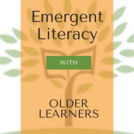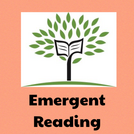
An emergent learner could be described as someone in the initial stages of learning to read and write and encompasses all behaviors and understandings preceding conventional reading and writing, as noted by Koppenhaver, Coleman, Kalman, and Yoider (1991) and Sulzby (1985). With the help of high-quality instruction, emergent learners will be provided the opportunity to acquire foundational reading and writing skills. As all beginning communicators, emergent learners rely on those around them to provide access and instruction to age-respectful and meaningful learning opportunities. Challenges may arise for students who struggle to manipulate books physically or for those who are non-speaking and/or use aided AAC. In such cases, this module offers solutions to support you as their teacher. Teachers must also face the reality of instructing all different learning levels, whether they are at the emergent, transitional, or conventional stages of literacy learning. This module also supports the creation of high-quality literacy lesson planning to meet your student's needs regardless of their learning stage. This task can be daunting and difficult without the right tools. Using OpenAI to support material adaptation and modifications can assist teachers in removing barriers and ensuring that all students can engage in enriching reading and writing experiences.
- Subject:
- English Language Arts
- Reading Foundation Skills
- Special Education
- Material Type:
- Lesson Plan
- Teaching/Learning Strategy
- Author:
- SETC CWU
- Sharon Redmon
- Dan Herlihy
- Washington OSPI OER Project
- Date Added:
- 05/03/2024
